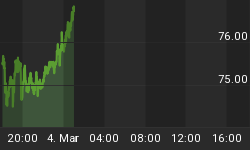Warnings about an imminent housing collapse seem to be appearing everywhere, along with dire predictions that such an event could send the US economy spiralling into recession. The problem, so we are told, is that an enormous amount of lending has been made below the prime rate. Some are already comparing the housing boom to Clinton's dot.com boom, and like that boom a housing collapse would a destructive shockwave through the economy including the stock market. Market nerves were not steadied by Greenspan's opinion that housing could spread into other economic sectors. The steep rise in foreclosures and the delinquency rate on home loans certainly lends weight to Greenspan's dismal prophecy.
Many of those who for years promoted the fallacy that a housing boom would stimulate the economy by fuelling a consumption boom are now warning that a housing bust could cause a recession. The thinking here is pretty straightforward. A rising housing market was thought to increase wealth which would then drive consumer spending. The counter argument is that this cannot be so because mortgages consist of transfers of purchasing power from lenders to borrowers and thus has no effect of aggregate spending. This criticism, however, is only valid for a country that operates with a genuinely sound monetary policy. America has not had one of those since Roosevelt took the country off the gold standard in 1933.
What the economic commentariat invariably miss is the fact that most of the credit that is extended to borrowers -- whether it's for a new car or a house -- has been created by the banking system which does so by making phony deposits. In other words, it is credit expansion that has been fuelling the boom.
The Wall Street Journal recently accused mortgage lenders of being greedy and of conning people into taking out loans that they could never hope to repay. The Journal overlooked the important fact that when the banking system floods the economy with credit this creates the impression that there are more savings available than actually exist. This situation is created by the Fed artificially lowering interest rates. (The same thing happened in Australia in the 1980s under a Labour government. It is happening again under a conservative government). Therefore it is not greed that drove the lending spree but excess deposits. Without excess credit there could have been no lending frenzy.
Merrill Lynch & Co. have warned that difficulties in the sub-prime market could lead to a tightening of credit which would trigger a recession. Naturally GDP would contract and unemployment would rise. This view seems to be supported by the fact that in the first 6 months of 2006 residential spending and housing construction accounted for about 6 percent and 10 percent, respectively, of GDP growth.
The problem here, however, is that GDP is not a measure growth. Furthermore, housing is not fixed investment: it is a consumption good. As a I have pointed out numerous times, business spending drives the economy and not consumption. Fortunately the US Bureau of Economic Analysis now produces a national income statistic called gross output. This statistic includes spending on intermediate goods. The December 2006 release for gross output for all industries was $22.857 trillion against a GDP of about $13 trillion. (I still think this figure is on the low side).
If we want to know the direction of the US economy then we should examine the bureau's gross output figure . In doing so we would put consumer spending in its proper perspective and arrive at the conclusion that we need to focus on production figures rather than consumption figures.
Last month the Fed reported that factory production and the output of mines and utilities leapt by 1.0 per cent. This is a big figure -- and an important one. If the higher stages of production are still expanding then the country is not yet on the verge of a recession, irrespective of the state of the housing market. If this is the case then the end of the real estate boom might actually result in much of that excess credit finding a home on the share market and so boost stock prices.
I don't know how long this inflationary boom can continue. If the world was on a gold standard the boom would already be over. As it is on a paper standard we have to wait until either manufacturing gets caught in a profits squeeze that will lower output, create idle capacity and cut back on labour, or the Fed raises interest rates to the point where the economy slides into recession.
Of course, when the economy does go into recession the market will, as usual, get the blame.















